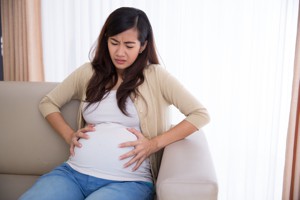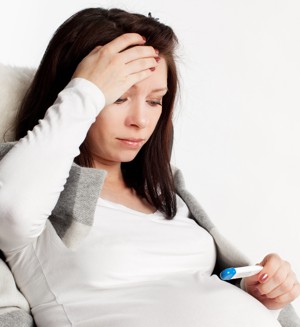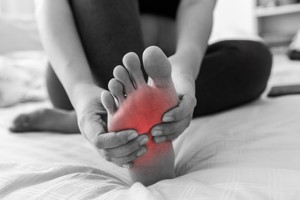 Now that you are pregnant you can expect your body to go through numerous changes. Some will bring you joy, for example, as you see your bump grow knowing that your baby will be born soon, others will bring you discomfort, such as the constipation caused by changes to your digestive system.
Now that you are pregnant you can expect your body to go through numerous changes. Some will bring you joy, for example, as you see your bump grow knowing that your baby will be born soon, others will bring you discomfort, such as the constipation caused by changes to your digestive system.
Some changes to your body may also be alarming and it is always best to seek medical advice if there is something that is concerning you. These changes may be a sign that something is wrong and it is time to seek help. Here we outline the warning signs and symptoms that you should never ignore.
Vaginal Bleeding
Many women experience small amounts of bleeding during their pregnancy, particularly in the first trimester, and then go on to give birth to healthy babies. Light spotting or bleeding isn’t necessarily a sign that something is wrong and there are lots of reasons this can happen. You should always discuss any bleeding with your midwife, even if it is just some light spotting.
However, if the bleeding is heavy, persistent, or accompanied with severe abdominal pain, then you need to seek medical help straight away, as it could be a sign of miscarriage or ectopic pregnancy. For more information about bleeding in pregnancy, check out our article here. (link to bleeding and spotting article)
Vaginal Discharge
It’s normal to experience an increased amount of vaginal discharge during pregnancy. This is your body’s way of protecting your cervix and baby against infection. However, if you notice that the discharge has a strange smell or colour then this could be an indication that you have an infection such as thrush or a sexually transmitted disease. Any infection or disease could be harmful to your baby so it’s best to get checked and treated as soon as possible.
High Fever
 A high fever is another indication that your body is fighting an infection, and again this can be dangerous to your baby.
A high fever is another indication that your body is fighting an infection, and again this can be dangerous to your baby.
If your temperature is above 38 degrees and not responding to paracetamol then you should discuss it with a doctor. If you suddenly develop breathing problems or severe pain then you should seek help immediately.
Painful / Burning Sensation When Urinating
Urinary Tract Infections (UTIs) are common in pregnancy due to changes in your body’s shape. If it becomes painful to urinate or you experience a burning sensation when you urinate or you have pain in your lower abdomen, then you many have developed a UTI.
Your midwife will check your urine at every appointment for signs of a UTI, as this can develop further into a more serious kidney infection or lead to complications with your pregnancy. However, UTIs can develop suddenly in between appointments so it is a good idea to be aware of the symptoms. You will need a course of antibiotics to treat the infection, so talk to your midwife or GP if you experience any of these symptoms.
Frequent Urination
It is normal to find yourself needing to pass urine more often during pregnancy, thanks to the pressure that your baby is putting on your bladder. However, if this becomes excessive, particularly at night, then it may also be a sign of gestational diabetes. Extreme thirst and urine that smells sweet are other symptoms of this condition that can lead to complications with labour and birth.
Unfortunately, for many women, gestational diabetes presents no symptoms at all and is only picked up during routine testing. If you are considered to be of a higher risk of gestational diabetes then you will be offered a test for this.
Blurred Vision
During the later stages of pregnancy, some women develop a condition called pre-eclampsia. This is where the placenta develops a problem and doesn’t get the sufficient amount of blood that it requires to function properly. Although in most cases it can be managed successfully, for a very low number of women it can cause severe complications such as organ failure and blood clots, as well as resulting in low birth weights or stillborn babies.
Blurred vision, or vision disturbances such as flashing lights, can be a sign of pre-eclampsia, and these symptoms usually occur once the condition has significantly developed. Thankfully, most cases of pre-eclampsia are picked up during the routine midwife appointments where the midwife will check your blood pressure and your urine. High blood pressure and protein in your urine are early indicators of pre-eclampsia. If you do experience vision changes then seek help as soon as possible.
Severe Abdominal Pain
It is normal to experience some cramping in your abdomen during your pregnancy as your uterus grows. However, if you have persistent or severe abdominal pain then you need to discuss it with your midwife or doctor. Depending on the stage of your pregnancy, the pain could signify a number of serious conditions, including miscarriage, pre-term labour, and problems with your placenta. Remember, it’s best to be safe than sorry, so if you have any concerns at all then seek medical help.
Sudden / Severe Swelling In Hands & Feet
 Swelling in your hands and feet is very common, especially in the later stages of pregnancy, as your body retains more fluid and your baby puts pressure on the main vein leading from your legs to your heart, resulting in more blood collecting in your feet. However, if the swelling is severe, or happens very quickly, then it may be a sign of pre-eclampsia, and you should seek help immediately.
Swelling in your hands and feet is very common, especially in the later stages of pregnancy, as your body retains more fluid and your baby puts pressure on the main vein leading from your legs to your heart, resulting in more blood collecting in your feet. However, if the swelling is severe, or happens very quickly, then it may be a sign of pre-eclampsia, and you should seek help immediately.
Severe Vomiting
Nausea and vomiting is experienced by many pregnant women in the first and second trimesters and can actually be considered a sign of a healthy pregnancy as it is caused by the body’s reaction to increasing levels of pregnancy hormones. However, some women experience severe vomiting with episodes of vomiting occurring several times a day. This condition is known as hyperemesis gravidarum and can lead to dehydration and weight loss in the mother, and low birth weight in the baby. If you have this condition, you may offered medication and if necessary, intravenous fluids in hospital.
If severe vomiting starts suddenly during your pregnancy, you will need to seek medical advice, as you may have developed food poisoning or an infection that could cause further complications.
Decrease In Baby’s Movements
During the second trimester you will start to feel your baby’s movements in your womb. Initially, you will feel slight flutters, easily mistaken for wind, and as your baby grows you will feel increasingly stronger kicks and other movements. Your baby may also develop a routine. For example, he or she may have quieter periods in the afternoon, and be a busy bee just as you want to go to bed.
The movements of your baby are an important indicator of his or her health. If you notice that your baby’s movements have decreased or stopped all together, then you should contact your midwife who will assess you further. There are a number of factors that lead to a decrease in your baby’s movements, including if you are dehydrated or stressed, however, some are more serious, such as a premature rupture of your membranes (waters), or problems with the placenta and cord. This is why any noticeable changes in your baby’s movements should be discussed with your midwife as soon as possible.
Persistent / Severe Itchiness
Changes in hormones and stretching skin can cause mild itching during pregnancy and this is normal. Furthermore, if you have previously suffered from eczema then you may find that this returns or worsens during your pregnancy. However, severe, persistent itching all over your body may be a sign of Obstetric Cholestasis (OC) which is a condition that affects the liver’s ability to process bile salts, causing these salts to build up in the body. Other symptoms include a jaundice (yellow) appearance, dark urine and pale faeces. This condition can lead to premature birth or stillbirth, so it’s important to report any symptoms to your midwife.
Thoughts Of Self Harm / Depression & Anxiety
 Thankfully, in recent years, the issue of post-natal depression has been widely discussed and women are regularly encouraged to seek help. However, the period following birth is not the only time that women can be affected by depression and anxiety, and many women experience these difficulties during pregnancy.
Thankfully, in recent years, the issue of post-natal depression has been widely discussed and women are regularly encouraged to seek help. However, the period following birth is not the only time that women can be affected by depression and anxiety, and many women experience these difficulties during pregnancy.
Your body undergoes many changes during pregnancy and sometimes this can be difficult to come to terms with. Some women become depressed when dealing with difficult morning sickness, others may struggle with how their body now appears, and some women are affected by a hormone imbalance. Common side effects include tiredness, tearfulness, a feeling of being disconnected from everyone around you, and a loss of interest in activities that previously gave you pleasure.
Some women experience severe anxiety during pregnancy. If you have previously suffered from anxiety then you are more prone to do so during pregnancy. You may find yourself excessively worrying about pregnancy symptoms and labour. Some women will frequently check certain things again and again to seek reassurance, others may experience heart palpitations and even panic attacks.
If you are affected by any of these symptoms then please seek help as soon as possible. If you can, speak to your midwife. Your midwife can advise you on the best course of action, and if necessary arrange treatment such as counselling or medications that are safe to use during pregnancy. If you have any thoughts of self-harm or suicide then you should speak to someone immediately. Don’t feel ashamed about seeking help, remember that you are doing what is best for you and your baby.
